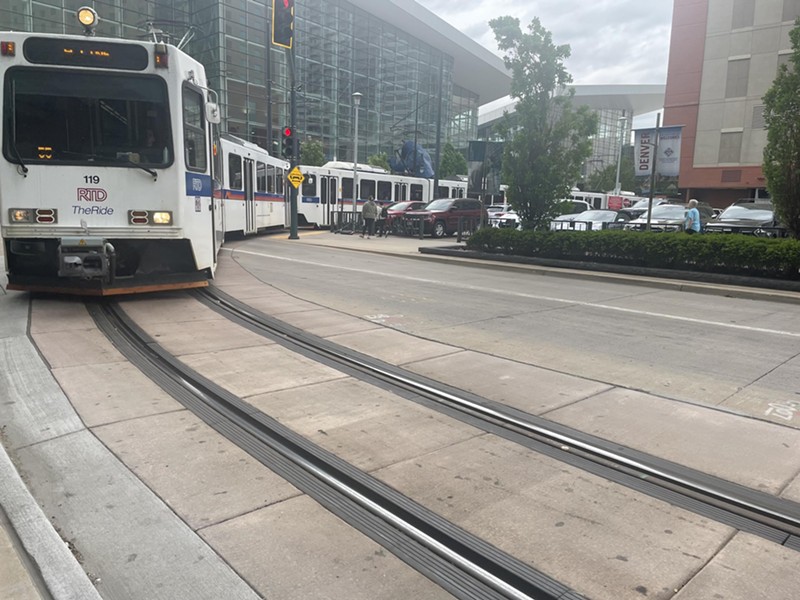Authored by former Denver mayoral candidate Kelly Brough and Common Sense policy and research director DJ Summers, the report, “Fork in the Railroad: RTD’s Ridership Dilemma,” shows that RTD ridership fell 46 percent from 2019 to 2022, while the operating budget slightly increased.
“The driving motive is, this is a huge investment we've made. We’ve got to make sure we're maximizing the return on this investment,” says Brough, now an urban development fellow with the institute. “We’ve got to do better. The way you measure success of a transportation system is the number of people using it. Well, we don't have a lot of people using it.”
The report’s key takeaways focus on budget, ridership and crime, and how all three impact RTD and the taxpayers funding it. In the report, Brough cited people feeling unsafe on RTD services as a pressing reason for lacking ridership.
The Common Sense Institute follows a model of using economics to analyze policies. Although the organization identifies as nonpartisan, it has been labeled as conservative-leaning in the past. For Brough, the goal was to figure out the state of RTD given its critical role in urban infrastructure as her team of researchers used publicly available data and conducted interviews to compile the report.
RTD officials say that many of the solutions identified by the report, such as alleviating crime or incentivizing companies to provide transit passes for the agency's employees, are already in the works.
“RTD looks forward to partnering with the Common Sense Institute and other stakeholders and community partners to address challenges highlighted in the report while, at the same time, leveraging opportunities that support RTD’s customers, employees, and operational efficiencies,” RTD says in a statement.
Fares Contribute Less Than 5 Percent to RTD Budget
RTD’s main source of funding is from sales and use taxes. Over 66 percent of its revenue from 2020 to 2022 came from those taxes. In Denver, each metro area resident chips in an average of $275 per year, the Common Sense report finds. But those contributions may not be enough.
“RTD’s budget has been climbing as its ridership has fallen,” the report says. “Between 2019 and 2022, ridership fell 46 percent while its operating budget increased 3 percent.”
In January 2024, fares accounted for only 4.4 percent of RTD’s operating costs, according to the report, which outlines a consistent fall since 2011, when fares made up 21.6 percent of RTD’s operating expenses, the district’s peak fare recovery. By 2019, fare recovery had declined to 15.5 percent, and when the COVID-19 pandemic hit in 2020, RTD fares dropped to cover just 8 percent of expenses.
“Unless ridership increases, this lower level of fare recovery means there is a greater level of public subsidy expected to maintain RTD,” the report concludes.
RTD’s budget has gone from $477 million in 2014 to a proposed $1 billion in 2024, the report adds.
“That's not a surprise, because the cost of everything has really gone up in the last couple of years, and RTD is no different,” Brough says. “But I think where the challenge comes in, is ridership has certainly not gone up with it and not recovered from the pandemic.”
She praises RTD’s current pilot program where fares are free for those eighteen and under to help kids get in the habit of using transit and not be intimidated by it, like some adults are.
In 2022 and 2023, RTD offered free fares during peak ozone season, but won’t be able to this year after the funding was eliminated by state legislators earlier this year — but in January, RTD lowered fares across its system in hopes that more people would ride.
“The new fares provide a simple, equitable, and affordable approach for customers, and they removed unnecessary burdens and confusion to using RTD’s services and discounts,” the agency says. “For example, the local and regional fare zones were consolidated to better support customers and remove barriers to accessing the system.”
According to RTD, it is still regrowing ridership lost during the pandemic, with a 33 percent increase in ridership between 2021 and 2022 and a 5.8 increase from 2022 to 2023, and over 65 million total boardings in 2023.
“While this number is less than the number of boardings prior to the COVID-19 pandemic, it closely aligns with nationwide ridership trends,” the district points out.
Brough says making it inexpensive for employers to buy EcoPasses, which gives people the unlimited ability to ride any of RTD’s services, is another strategy that could help increase ridership. While she doesn’t think it’s viable to make the entire system fare-free, she says that since fares aren’t contributing significantly to RTD’s budget, anyway, then creative ways to get more people riding are worth it even if it means sacrificing cost recovery.
“RTD could analyze the potential costs per district of universal free fares or offering deeply low-cost passes for employers to provide their employees,” the CSI report suggests. “Neither may be the right approach, but each could highlight different models that would help remove the cost barrier to riding.”
RTD says it is also working to maximize how its services can get people to and from large-scale events like concerts and festivals.
Perception of Crime Hurts RTD Ridership
One of the top issues facing RTD is crime at bus and light rail stations and on its vehicles, according to the report, although it’s tricky to figure out the actual status of crime on RTD property. RTD is not a 911 service, so emergency calls in the district are often rerouted through another police department. In some cases, transit police don’t have jurisdiction over much more than a small area near a station, so crimes are tracked through other police departments.
According to Colorado Bureau of Investigation statistics, crime near public transit has increased in the last five years — but RTD’s internal data shows a decline.
The CBI finds that crime at Colorado air, bus and train terminals has spiked in recent years. From 2019 to 2023, drug violations at those locations increased by 248 percent; in 2023 RTD police handed out 526 citations per month compared to 372 in 2022.
Violent crimes including murder, aggravated assault and non-consensual sex assault also rose in transit locations, according to CBI data, as did motor vehicle theft, larceny and fraud.
But according to RTD’s police department data, which tracks crimes per month, crime peaked in 2016 at 1,130 crimes per month and has mostly declined since. In 2023, 560 average monthly crimes were reported by the department.
“First, I'd say we should just get clear on how we're collecting the data consistently, so we have good data that we're all using,” Brough says. “That said, I also think — particularly around drug use — what we know is people looking for shelter might choose to ride the train because they had nowhere else to go.”
Making sure people have safe places to go during the day if the shelter they are staying in is only open at night would improve both real safety and the perception of how safe transit is, Brough says.
RTD says its safety personnel strategy is evolving from a traditionally contracted security force to sworn officers. In 2019, RTD had nineteen sworn officers. Now it has over sixty officers, with a goal of getting up to 119 by the end of the year. These aggressive hiring moves have allowed officers to conduct more proactive work to reduce crimes, RTD adds.
“With increased staffing, RTD-PD in May 2024 introduced a dedicated team of officers working an overnight shift, ensuring RTD calls for service are prioritized at any hour by the agency’s own police officers,” the agency says.
RTD also argues that crime in its terminals and on its vehicles reflects broader trends in service areas where criminal or antisocial behavior in the Denver area crosses onto buses and trains.
Brough says a possible solution to that problem would be agreements with local police departments allowing RTD officers to pursue criminal suspects around its service areas and other police departments' officers to do the same with RTD territory.
“One of the things we heard was if I’m committing a crime and I crossed the street onto RTD property, I now need an RTD police officer instead of the local jurisdiction,” Brough says.
Closing that loophole would mean that people committing crimes don’t use hopping on a train or bus as a get-out-of-jail-free card, she suggests. RTD says it currently relies on different partnerships with other law enforcement jurisdictions to address crime.
But no matter the actual crime numbers, people won’t ride the system if they don't think it's safe.
“Even if there's no crime, if I perceive it's not safe, we still have a challenge,” Brough says. “It's really clear we've got work to do in this space.”
RTD says it is actively working toward what it calls a Welcoming Transit Environment to reduce the impact of criminal and code-of-conduct violations and show people it’s safe to ride. Brough adds that more ridership would help create a safer perception of RTD’s system and show that its buses and trains are worth the money.
“As lawmakers and developers lean into the system more, it is imperative that RTD deliver robustly on its primary goal — moving as many riders as possible from point A to point B,” the Common Sense Institute report concludes.
This summer, almost all of RTD's light rail lines will be interrupted or rerouted as the agency completes track repairs. In an RTD board of directors meeting, citizens suggested that constant route changes from construction and general unreliability are major reasons why many don't ride.











